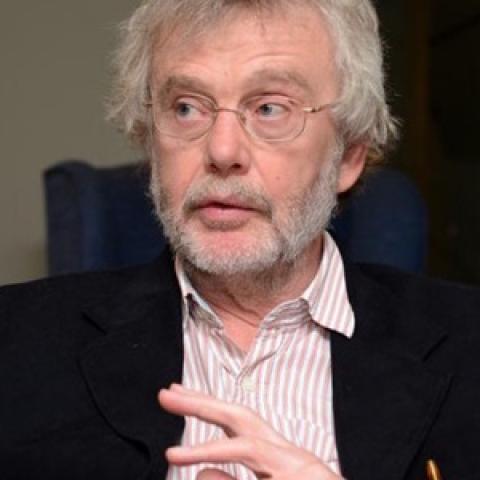Philip Hardie
Senior Research Fellow, Trinity College, and Honorary Professor of Latin, University of Cambridge
Spring 2016 Sather Lectures
Classicism and Christianity in Late Antique Latin Poetry
February 4:
Lecture 1: The Long Goodbye: Ausonius and Paulinus of Nola
Maud Fife Room, 315 Wheeler Hall, 8 p.m.
February 11:
Lecture 2: Virgilian Plots: Public Ideologies and Private Journeys
370 Dwinelle Hall, 5:30 p.m.
February 18:
Lecture 3: Paradox, Mirabilia, Miracles
370 Dwinelle Hall, 5:30 p.m.
February 25:
Lecture 4: Cowherds and Saints: Realism and Humour in Paulinus of Nola
370 Dwinelle Hall, 5:30 p.m.
March 3:
Lecture 5: Cosmos: Classical and Christian Universes
370 Dwinelle Hall, 5:30 p.m.
March 10:
Lecture 6: Mosaics and Intertextuality
370 Dwinelle Hall, 5:30 p.m.

More about Philip Hardie
Philip Hardie works on Latin poetry and its reception, with a particular focus on epic. Having recently written extensively on the Renaissance, he is now traveling back in time to late antiquity.
Trained in Oxford, he went on to an MPhil at the Warburg Institute, London. In 2002, having been a Fellow of New Hall and University Reader in Classics in Cambridge, he was elected Corpus Christi Professor of Latin at Oxford. In 2006 he returned to Cambridge to take up his current position as Senior Research Fellow at Trinity College, Cambridge, where he is also an honorary Professor of Latin.
His books include Virgil's Aeneid: Cosmos and Imperium (1986); The Epic Successors of Virgil (1993); Ovid's Poetics of Illusion (2002); Lucretian Receptions. History, The Sublime, Knowledge (2009); Rumour and Renown. Representations of Fama in Western Literature (2012); The Last Trojan Hero: A Cultural History of Virgil’s Aeneid (2014). He has edited The Cambridge Companion to Ovid (2002), The Cambridge Companion to Lucretius (2007 with Stuart Gillespie), and the volume on the Renaissance in the Oxford History of Classical Reception in English Literature (2015, with Patrick Cheney).
About the Spring 2016 Lectures
After centuries of near silence, Latin poetry underwent a renaissance in the later fourth and fifth centuries AD in the works of major authors who include Ausonius, Claudian, Prudentius and Paulinus of Nola. This period is a milestone in the reception of the classics of late Republican and early imperial poetry. The lectures will explore the different ways in which poets writing on non-Christian and Christian subjects use the classical tradition, as they construct a relationship with Rome's pagan and imperial past, and with the belief system of the now not so new state religion, Christianity. The impact of tradition and doctrine on late antique aesthetics and intertextuality will also be tested.